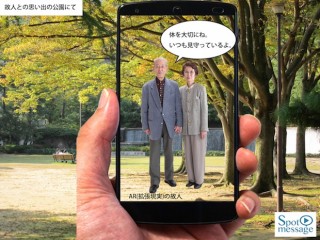Loading
Search
▼ Mourners in Japan Stay Close to Deceased Loved Ones with Augmented Reality Graves
- Category:Experience
Japan’s society is aging — and rapidly. With the second-highest life expectancy in the world combined with a falling birth rate, the numbers of retirees and older citizens will only continue to rise.
Things are changing socially to cope with this seismic shift, not least tax hikes to pay for the burden of health care and pension payouts as well as a wave of “shukatsu” (preparing for the end) services such as a try-it-yourself coffins and Buddhist monk dispatches. After all, an aging society also means a dying society, where death becomes the new norm in everyday life.
Now augmented reality technology is being used to offer virtual “graves” where you can visit your deceased loved ones in a place of your choosing.
Grave retailer Ryoshin Sekizai has launched the service for just ¥500 a month, allowing mourners to experience a mobile augmented reality version of a loved one’s “grave” at a designated location like a favorite park or other location with particular memory value.
The grave is enhanced with photographs and the deceased can even record video and voice messages before they pass away. The first year is free of charge if applying while the occupant(s) of the virtual grave is still alive.
The customer hands over the ashes of their relative to Ryoshin Sekizai for storage and then uses their phone to “visit” the virtual grave whenever they have the urge.
This service is tapping into a useful niche as the majority of the population lives in Tokyo and other major urban centers, and does not always have the time to make the journey back to a home province for the busy August Obon festival or other important dates in the religious calendar when visiting graves and holding Buddhist ceremonies is customary.
We have heard about AR graves before, since the chronic shortage of land in Japan outside remote rural areas has long led to innovations of this kind. Previous schemes include integrating QR codes into grave stones as well as RFID cards so you can access an urn in a mass storage center, rather than forking out for an expensive plot.
- August 22, 2017
- Comment (0)
- Trackback(0)


